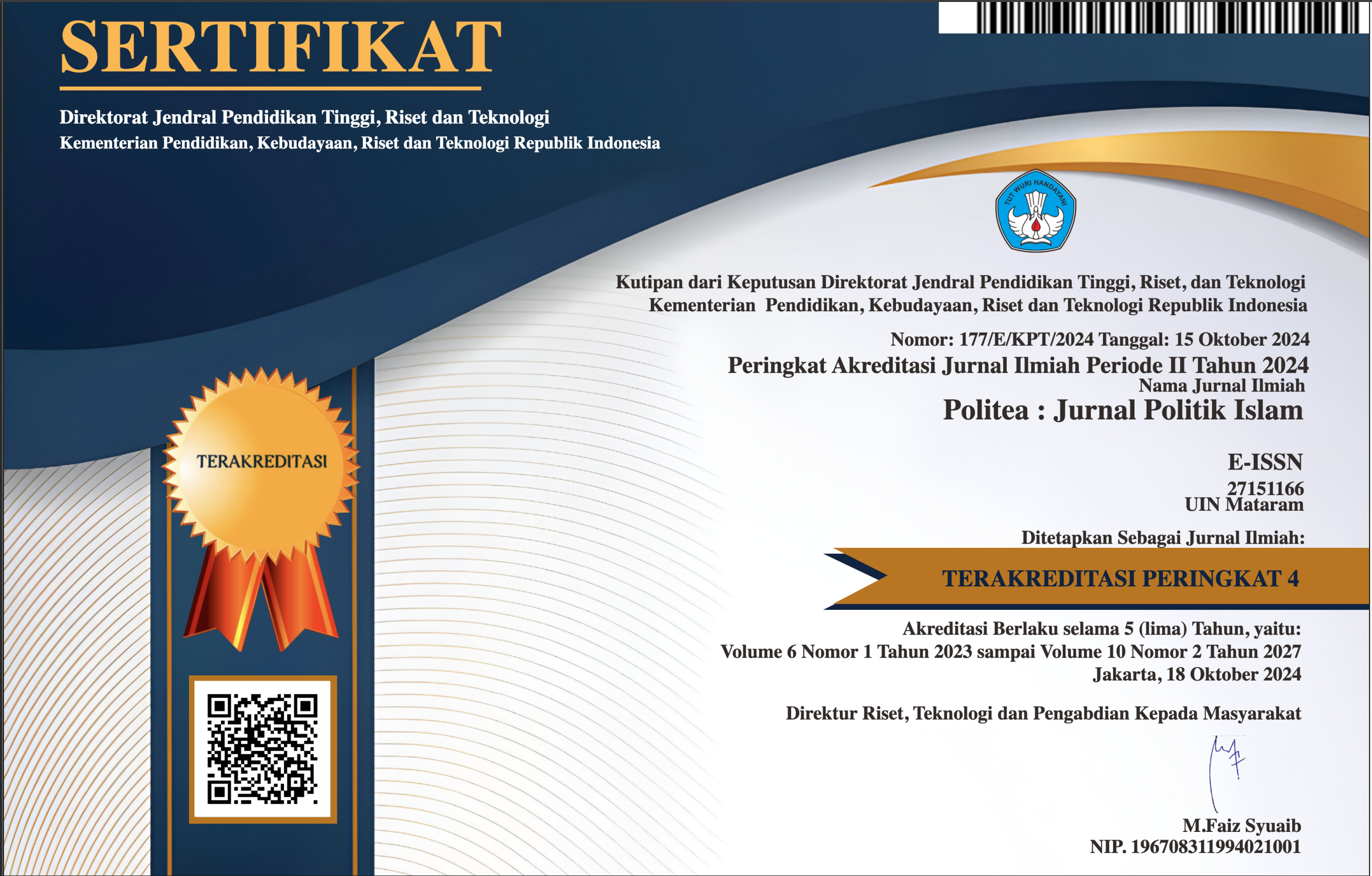TEORI ADMINISTRASI HENRI FAYOL: GAGASAN, KONTRIBUSI, DAN BATASANNYA
DOI:
https://doi.org/10.20414/politea.v6i2.8544Keywords:
Administrative Theory, Henri Fayol, Management Development, Contributions and Limitations, Implementation in OrganizationsAbstract
This paper aims to examine and discuss the concepts, contributions, and limitations of Henri Fayol's administrative theory in the field of management development. Many experts assert that Fayol's administrative theory has made a significant impact on the advancement of modern management. Nevertheless, this theory has also faced criticism and possesses certain constraints when applied in practice. In this study, a historical analysis methodology is employed to acquire a more profound understanding of the history, background, core ideas, implementation, and contributions of Fayol's administrative theory. Furthermore, this research critically evaluates several limitations of Fayol's administrative theory that have been previously identified in relevant literature. These limitations encompass the insufficient consideration of human factors within organizations, the influence of cultural and organizational environments, inflexibility in complex and dynamic situations, as well as an excessive focus on efficiency rather than effectiveness. Despite these limitations, Fayol's administrative theory continues to serve as a crucial foundation in the development of modern management
Downloads
References
Breeze, John D. “Henri Fayol’s Centre for Administrative Studies.” Journal of Management History 1, no. 3 (January 1, 1995): 37–62. https://doi.org/10.1108/13552529510095152.
Daft, Richard L. The New Era of Management. 9th International student edition. Mason, Ohio: South Western, Cengage Learning, 2010.
Fells, Michael J. “Fayol Stands the Test of Time.” Journal of Management History 6, no. 8 (January 1, 2000): 345–60. https://doi.org/10.1108/13552520010359379.
Golden Pryor, Mildred, and Sonia Taneja. “Henri Fayol, Practitioner and Theoretician – Revered and Reviled.” Edited by Joyce Heames. Journal of Management History 16, no. 4 (January 1, 2010): 489–503. https://doi.org/10.1108/17511341011073960.
Hatchuel, Armand, and Blanche Segrestin. “A Century Old and Still Visionary: Fayol’s Innovative Theory of Management.” European Management Review 16, no. 2 (2018): 399–412. https://doi.org/10.1111/emre.12292.
Lamond, David. “On the Value of Management History: Absorbing the Past to Understand the Present and Inform the Future.” Edited by David Lamond. Management Decision 43, no. 10 (January 1, 2005): 1273–81. https://doi.org/10.1108/00251740510634859.
Muldoon, Jeffrey, Joshua S. Bendickson, Furkan A. Gur, and Patrick J. Murphy. “Management’s Knowledge Filter: Entrepreneurship Theory and the Historic Conceptual Evolution of Opportunism in Management Studies.” Journal of Small Business and Enterprise Development 29, no. 3 (January 1, 2021): 402–20. https://doi.org/10.1108/JSBED-06-2021-0231.
Parker, Lee D., and Philip Ritson. “Fads, Stereotypes and Management Gurus: Fayol and Follett Today.” Edited by David Lamond. Management Decision 43, no. 10 (January 1, 2005): 1335–57. https://doi.org/10.1108/00251740510634903.
Peaucelle, Jean?Louis, and Cameron Guthrie. “The Private Life of Henri Fayol and His Motivation to Build a Management Science.” Journal of Management History 18, no. 4 (January 1, 2012): 469–87. https://doi.org/10.1108/17511341211258774.
Peltonen, Tuomo. Organization Theory: Critical and Philosophical Engagements. United Kingdom: Emerald Publishing, 2016.
Rahman, Md Hasebur. “Henry Fayol and Frederick Winslow Taylor’s Contribution to Management Thought: An Overview.” ABC Journal of Advanced Research 1, no. 2 (December 31, 2012): 94–103. https://doi.org/10.18034/abcjar.v1i2.10.
Reid, Donald. “Fayol: From Experience to Theory.” Journal of Management History 1, no. 3 (January 1, 1995): 21–36. https://doi.org/10.1108/13552529510095134.
———. “Reading Fayol with 3D Glasses.” Journal of Management History 1, no. 3 (January 1, 1995): 63–71. https://doi.org/10.1108/13552529510095143.
Rodrigues, Carl A. “Fayol’s 14 Principles of Management Then and Now:A Framework for Managing Today’s Organizations Effectively.” Management Decision 39, no. 10 (January 1, 2001): 880–89. https://doi.org/10.1108/EUM0000000006527.
Smith, Ian, and Trevor Boyns. “British Management Theory and Practice: The Impact of Fayol.” Edited by David Lamond. Management Decision 43, no. 10 (January 1, 2005): 1317–34. https://doi.org/10.1108/00251740510634895.
Suddaby, Roy. “Toward a Historical Consciousness: Following the Historic Turn in Management Thought.” Management 19, no. 1 (September 19, 2016): 46–60.
Thompson Heames, Joyce, and Jacob W. Breland. “Management Pioneer Contributors: 30?year Review.” Edited by Joyce Heames. Journal of Management History 16, no. 4 (January 1, 2010): 427–36. https://doi.org/10.1108/17511341011073915.
Voxted, Søren. “100 Years of Henri Fayol.” Mrev Management Revue 28, no. 2 (June 25, 2017): 256–74. https://doi.org/10.5771/0935-9915-2017-2-256.
Wook Yoo, Jae, David J. Lemak, and Youngjun Choi. “Principles of Management and Competitive Strategies: Using Fayol to Implement Porter.” Journal of Management History 12, no. 4 (January 1, 2006): 352–68. https://doi.org/10.1108/17511340610692734.
Wren, Daniel A. “Henri Fayol as Strategist: A Nineteenth Century Corporate Turnaround.” Management Decision 39, no. 6 (January 1, 2001): 475–87. https://doi.org/10.1108/EUM0000000005565.
———. “Henri Fayol: Learning from Experience.” Journal of Management History 1, no. 3 (January 1, 1995): 5–12. https://doi.org/10.1108/13552529510095116.
Wren, Daniel A., Arthur G. Bedeian, and John D. Breeze. “The Foundations of Henri Fayol’s Administrative Theory.” Management Decision 40, no. 9 (January 1, 2002): 906–18. https://doi.org/10.1108/00251740210441108.
Downloads
Published
Issue
Section
License
Copyright (c) 2023 Febrian Huamaidi Sukmana

This work is licensed under a Creative Commons Attribution-ShareAlike 4.0 International License.







